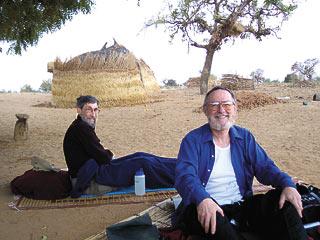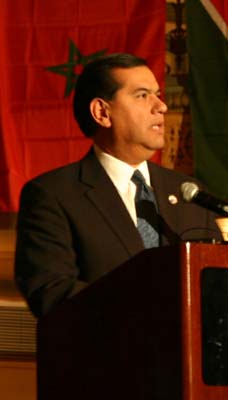2006.05.10: May 10, 2006: Headlines: COS - Niger: Return to our Country of Service - Niger: Service: Medicine: Mount Shasta Herald: Emergency room doctor Jack Saunders recently returned to the African country of Niger, nearly 40 years after he served there in the Peace Corps from 1966-69
Peace Corps Online:
Directory:
Niger:
Peace Corps Niger :
The Peace Corps in Niger:
2006.05.10: May 10, 2006: Headlines: COS - Niger: Return to our Country of Service - Niger: Service: Medicine: Mount Shasta Herald: Emergency room doctor Jack Saunders recently returned to the African country of Niger, nearly 40 years after he served there in the Peace Corps from 1966-69
Emergency room doctor Jack Saunders recently returned to the African country of Niger, nearly 40 years after he served there in the Peace Corps from 1966-69

“I guess I was most impressed at how Niger has continued to be such a pleasant place in spite of the tripling of the population. No cops with machine guns, no shakedowns at checkpoints, no bribes requested, and little in the way of angry looks and reverse racism. It's amazing to feel absolutely safe while walking around in a large noisy city with no white folks in sight. I get the impression that although things are run quite differently there, there are actually run well, in a sense, given the extreme poverty of the nation as a whole.”
Emergency room doctor Jack Saunders recently returned to the African country of Niger, nearly 40 years after he served there in the Peace Corps from 1966-69
40 years later, Peace Corps volunteer returns to Africa
By Paul Boerger
Published: Wednesday, May 10, 2006 5:28 PM CDT
Caption: Jack Saunders, right, a Mercy Medical Center Mt. Shasta emergency room doctor, and Joel Neuburg returned to Africa nearly 40 years after serving in Niger in the Peace Corps.
Mercy Medical Center Mount Shasta emergency room doctor Jack Saunders recently returned to the African country of Niger, nearly 40 years after he served there in the Peace Corps from 1966-69.
Saunders made his recent trip with two other men with whom he served in the Peace Corps and his 27 year old son Adam.
The trio had worked primarily in the village of Lido and Saunders said he saw huge changes in some areas and little change in others.
Saunders, Sandy Leeder and Joel Neuburg primarily worked in the village of Lido. They came together this year to revisit the villages of their youth and view a total eclipse that coincidentally had optimal viewing from the area.
“We were there in the '60s to teach them rudimentary improvements in agriculture and build a rural agriculture cooperative,” Saunders said. “I didn't recognize Lido. The streets had changed and modern buildings, by their standards, had gone up.”
Saunders and Neuburg had maintained sporadic contact since their days in the Peace Corps and a call from Leeder to view the eclipse brought the trio back to Africa.
Niger is located in northwestern Africa below Algeria and Libya on the edge of the Sahara desert.
Saunders kept a journal during the trip, and quotes from his writings are mixed with a recent interview for this story.
By our standards, Lido is a primitive village with water drawn by hand from wells, no electricity and shelters made of dirt bricks or primitive stalk huts. Millet is the main crop with white rice purchased as a supplement.
Saunders said the population had grown from 1,000 to approximately 4,500.
From Saunders' journal:
“The town in HUGE. It is unrecognizable to me. It has quadrupled in size. There are many large trees, which is nice.”
“Everyone used to have a horse. I rode a horse until I got a small car in my last year there. I spent several years on horseback,” Saunders said. “There were no horses left. They had to sell them because they couldn't afford to feed them. There are lots of motor scooters and a few cars now.”
Another large change that struck Saunders was the dearth of manufactured goods.
“There is so much plastic. Everything used to be made out of biodegradable local materials,” Saunders said. “Now there are so many imported items and they wind up on the ground as trash. They have no tradition of cleaning up.”
From Saunders journal:
“There are plastic wrappers everywhere except in the swept dirt floors of the compounds and houses. The half mile between the rouga and the town is strewn with faded pieces of clear, blue, and black plastic.
When we were PCVs, there was relatively little trash because everything was biodegradable. Most everything was made from local materials, so there was little plastic. We noticed that nearly everything in the roadside stalls is imported.”
Saunders said poverty has grown in his absence.
“There has been a tremendous increase in poverty in the villages. They are no longer able to sustain themselves,” Saunders said. “The populations have grown and there is not enough water. The Sahara desert is growing. The dust from the desert is like fog. When we were there before, the farmers would get 100 bags of millet from an acre. Now they get ten.”
Saunders noted that all is not grim and what may seem like a small thing to us is large for the villagers.
“We measure progress in huge leaps. They went from one millet sack on the back of a donkey to three millet sacks and the driver on a cart pulled by a donkey. For them, that's a huge increase in productivity,” Saunders said. “The millet for the most part is still pounded by hand, but a few gas engine mills have appeared.”
Saunders said despite the problems, the people of Niger are hard working and gracious.
“There is a tremendous increase in energy for the people to better themselves,” Saunders said. “We were able to travel in one of the poorest countries in the world in complete safety. We were never felt threatened or asked for a bribe.”
Saunders said they were remembered by a few of the Lido villagers.
“Sandy had married and divorced Kawaji the daughter of the village chief. She was still there. She was a beautiful young woman and was still a very good looking 62 year old,” Saunders said.
From Saunders journal:
“To our surprise the old chief was still there, somewhat blind but otherwise unchanged. We also greeted the chief's father-probably about 90 years old and blind also.
We toured the town and visited for 2 hours or so. Many townspeople recognized and greeted Joel and me, but some got me and Sandy mixed up. Joel recognized some of the people, and I only remembered the chief.”
Saunders said there are few men in the villages because as a pastoral people they are out moving the cattle for hundreds of miles for grazing or have moved to the cities in search of work and money.
“The women were hot for for my son Adam because they knew he could make them rich,” Saunders said.
Saunders said although Niger is a democracy, chiefs still head the villages.
“When were there in the 60s', we tried to institute democratic elections in a village. We were escorted out of town at gun point,” Saunders said.
Saunders said Islamic influence has grown dramatically since he was there last.
“Islam is taking over. Libya and Saudi Arabia are supporting building mosques and madrasses,” Saunders said. “Unmarried women would go bare breasted when we where there before. I didn't see a single bare breast on the trip. Women in the cities are wearing veils.”
When they left the country, the trio left behind almost everything they had brought.
“They are so poor. We gave them just about everything, sleeping bags, flashlights, luggage, medicine and clothing,” Saunders said.
In addition, Saunders had brought medical supplies for the missionary hospital and notebook paper and pens for the children.
“Niger is looking ahead to the future. They have cut down on government monopolies and there are cell towers everywhere along the highways,” Saunders said. “There is a tremendous amount of commercial activity.”
Saunders said the Peace Corps work they did in Niger was “temporary.”
“We were part of the green revolution adding fertilizer into growing crops,” Saunders said. “They can't afford fertilizer anymore and the population has outstripped the production.”
But Saunders sees bright spots in the Niger's future.
From Saunders journal:
“I guess I was most impressed at how Niger has continued to be such a pleasant place in spite of the tripling of the population. No cops with machine guns, no shakedowns at checkpoints, no bribes requested, and little in the way of angry looks and reverse racism. It's amazing to feel absolutely safe while walking around in a large noisy city with no white folks in sight. I get the impression that although things are run quite differently there, there are actually run well, in a sense, given the extreme poverty of the nation as a whole.”
“This is an African country that is taking care of itself. It's beautiful to see,” Saunders said.
When this story was posted in May 2006, this was on the front page of PCOL:





Peace Corps Online The Independent News Forum serving Returned Peace Corps Volunteers
 | Help Peace Corps get its full Appropriation
Senators DeWine, Feinstein, Santorum, and Durbin are asking their colleagues to join them in signing a letter to Senate Appropriations leaders to fully fund the President's FY07 request for the International Affairs Budget, including a full appropriation for the Peace Corps. Forty-five Senators have already signed on. Here's how you can help. Please make your call by May 16. |
 | The Peace Corps Library
The Peace Corps Library is now available online with over 40,000 index entries in 500 categories. Looking for a Returned Volunteer? Check our RPCV Directory. New: Sign up to receive PCOL Magazine, our free Monthly Magazine by email. Like to keep up with Peace Corps news as it happens? Sign up to recieve a daily summary of Peace Corps stories from around the world. |
 | PC evacuates East Timor, hopes to return
Volunteers serving in East Timor have safely left the country as a result of the recent civil unrest and government instability. Latest: The Peace Corps has informed us that they are monitoring the security situation on a daily basis and that it is the intention of the Peace Corps to return to East Timor if the security situation improves. |
 | It's Official: Vasquez nominated to FAO
Exactly one week ago we predicted that Director Vasquez would soon be receiving a major ambassadorship. Today the White House confirmed that Vasquez will be the new Representative to the United Nations Agencies for Food and Agriculture replacing Tony Hall.
PCOL Comment: Director Vasquez, let us be the first to thank you for your service to the Peace Corps, congratulate you on your new appointment, and wish you good luck in your future endeavors. Although we have had our differences over the years and we opposed your nomination in 2001, we think you are leaving a solid legacy of accomplishment and have served the Peace Corps well.
Initiatives and Accomplishments: Vasquez's major initiatives and accomplishments since becoming Peace Corps Director include: an agreement with Mexico in 2003 to host volunteers, sending RPCVs to work domestically in Hurricane relief after Katrina, emphasis on recruitment of minorities and of community college graduates, upgrading Peace Corps' infrastructure especially IT upgrades in the online application tracking process and the Volunteer Delivery System, an emphasis on safety and security of volunteers including the creation of a Situation Room at Peace Corps Headquarters, modifying Peace Corps' "Five Year Rule" for employment, and the expansion of the Peace Corps to its highest level in 30 years. He is the third longest serving Peace Corps Director after Loret Ruppe Miller and Sargent Shriver. |
 | Interview with a Hit Man
RPCV John Perkins says that for many years he was an "economic hit man" in the world of international finance whose primary job was to convince less developed countries to accept multibillion dollar loans for infrastructure projects that left the recipient countries wallowing in debt and highly vulnerable to outside political and commercial interests. In this exclusive interview for "Peace Corps Online," Colombia RPCV Joanne Roll, author of Remember with Honor, talks to Perkins about his Peace Corps service, his relation with the NSA, "colonization" in Ecuador, the consequences of his work, why he decided to speak out, and what his hopes are for change. |
 | Peace Corps stonewalls on FOIA request
The Ashland Daily Tidings reports that Peace Corps has blocked their request for information on the Volkart case. "After the Tidings requested information pertaining to why Volkart was denied the position — on March 2 — the newspaper received a letter from the Peace Corps FOIA officer stating the requested information was protected under an exemption of the act." The Dayton Daily News had similar problems with FOIA requests for their award winning series on Volunteer Safety and Security. |
 | PCOL readership increases 100%
Monthly readership on "Peace Corps Online" has increased in the past twelve months to 350,000 visitors - over eleven thousand every day - a 100% increase since this time last year. Thanks again, RPCVs and Friends of the Peace Corps, for making PCOL your source of information for the Peace Corps community. And thanks for supporting the Peace Corps Library and History of the Peace Corps. Stay tuned, the best is yet to come. |
 | History of the Peace Corps
PCOL is proud to announce that Phase One of the "History of the Peace Corps" is now available online. This installment includes over 5,000 pages of primary source documents from the archives of the Peace Corps including every issue of "Peace Corps News," "Peace Corps Times," "Peace Corps Volunteer," "Action Update," and every annual report of the Peace Corps to Congress since 1961. "Ask Not" is an ongoing project. Read how you can help. |
 | PC announces new program in Cambodia
Director Vasquez and Cambodia's Deputy Chief of Mission Meng Eang Nay announced a historic new partnership between the Peace Corps and the Kingdom of Cambodia that will bring volunteers to this Southeast Asian country for the first time. Under King Norodom Sihamoni and Prime Minister Hun Sen, Cambodia has welcomed new partnerships with the U.S. government and other U.S. organizations. |
 | Peace Corps suspends program in Bangladesh
Peace Corps Director Gaddi H. Vasquez announced the suspension of the Peace Corps program in Bangladesh on March 15. The safety and security of volunteers is the number one priority of the Peace Corps. Therefore, all Peace Corps volunteers serving in Bangladesh have safely left the country. More than 280 Peace Corps volunteers have served in Bangladesh since the program opened in November 1998. Latest: What other newspapers say. |
 | Invitee re-assigned after inflammatory remarks
The Peace Corps has pulled the invitation to Derek Volkart to join the Morocco Training Program and offered him a position in the Pacific instead after officials read an article in which he stated that his decision to join the Peace Corps was in "response to our current fascist government." RPCV Lew Nash says that "If Derek Volkart spoke his mind as freely in Morocco about the Moroccan monarchy it could cause major problems for himself and other Peace Corps volunteers." Latest: Volkart reverses stance, takes new assignment in Paraguay. |
 | RPCV admits to abuse while in Peace Corps
Timothy Ronald Obert has pleaded guilty to sexually abusing a minor in Costa Rica while serving there as a Peace Corps volunteer. "The Peace Corps has a zero tolerance policy for misconduct that violates the law or standards of conduct established by the Peace Corps," said Peace Corps Director Gaddi H. Vasquez. Could inadequate screening have been partly to blame? Mr. Obert's resume, which he had submitted to the Peace Corps in support of his application to become a Peace Corps Volunteer, showed that he had repeatedly sought and obtained positions working with underprivileged children. Read what RPCVs have to say about this case. |
 | Why blurring the lines puts PCVs in danger
When the National Call to Service legislation was amended to include Peace Corps in December of 2002, this country had not yet invaded Iraq and was not in prolonged military engagement in the Middle East, as it is now. Read the story of how one volunteer spent three years in captivity from 1976 to 1980 as the hostage of a insurrection group in Colombia in Joanne Marie Roll's op-ed on why this legislation may put soldier/PCVs in the same kind of danger. Latest: Read the ongoing dialog on the subject. |
Read the stories and leave your comments.

Some postings on Peace Corps Online are provided to the individual members of this group without permission of the copyright owner for the non-profit purposes of criticism, comment, education, scholarship, and research under the "Fair Use" provisions of U.S. Government copyright laws and they may not be distributed further without permission of the copyright owner. Peace Corps Online does not vouch for the accuracy of the content of the postings, which is the sole responsibility of the copyright holder.
Story Source: Mount Shasta Herald
This story has been posted in the following forums: : Headlines; COS - Niger; Return to our Country of Service - Niger; Service; Medicine
PCOL32767
52






















